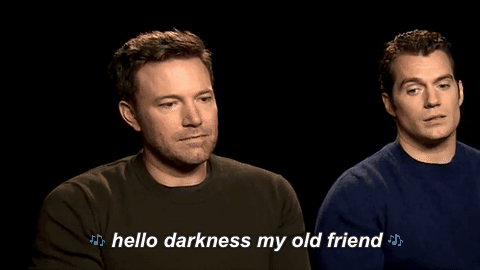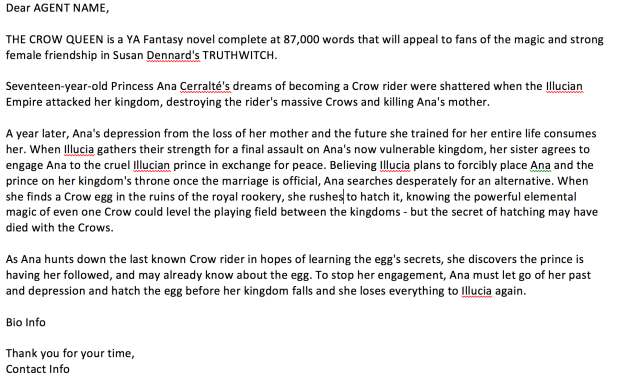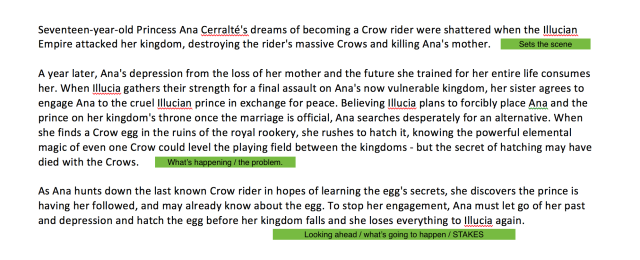Congrats – you wrote thousands and thousands of words in a comprehensible order with cool characters and a kickass plot, and now you’re ready to send it to some agents.
Now all you have to do is distill those thousands of words into ~250 words. No big deal.

There are a lot of great resources out there about writing queries, so what I want to focus on is how I applied those tips and tricks to writing my own query.
There are 3 main parts to a query:
- The Stats: includes your books stats, like the title and genre.
- The Query: the story; what happens and why it matters.
- The Bio: who are you and why are you qualified to write this book.
I’ll break down each piece of it below, using my query as an example.
Here’s my query:

The Stats
The stats should ALWAYS include the:
- Title
- Genre (Fantasy, Crime, etc)
- Age category (Young Adult, Middle Grade, etc)
- Word count
It can optionally include:
- Comps
- A quick snippet about why you’re querying the agent.
There are a lot of opinions about whether the stats should go at the start or end of a query. The most important determining factor is whether an agent specifies a preference.
Research the agents you plan to sub to. Look for interviews they’ve done. A lot of times agents will talk about preferences that they don’t mention in their agency guidelines because they’re not required, just preferred. Some like the stats at the start, some at the end.
Some even have preferences about what’s included in the stats, such as a personalization.
Here are 2 great resources for agent interviews: - Michelle4Laughs - Literary Rambles
If an agent doesn’t have a preference, then it’s up to you. If you have strong comps or a strong personalization, starting with it can be effective to set the stage.
My stats mattered to me because I was subbing to agents interested in strong female friendships, so I put it at the front. I also wanted the agent to know they were reading a Fantasy query right off the bat.

The Query
For me, Step 1 for drafting the body of my query was putting together an outline of my book. What are the major things that happen in each chapter? This is also really helpful for writing a synopsis. From there, I looked for the ways each of those big events fit into the overarching storyline.
Queries are a delicate balance of setting the scene and looking ahead. What happened, what is happening, and what’s going to happen?
For my story, these events set the scene:
- The Crows are destroyed.
- Ana’s mother is killed.
What’s happening (the problem) is an enemy kingdom is threatening them and they must respond. At the same time, she’s engaged to the prince and finds the Crow egg.
Looking ahead, she must now hatch the egg to stop her engagement and protect her kingdom.
Step 2 was identifying the stakes. I cannot express enough how important it is to have clear, identifiable stakes in your query. What will happen if your MC fails? Why does any of what’s happening matter?
Really this is just a part of the looking ahead bit, but I separated it out because it’s a common mistake to underemphasize the stakes.

Some tips for the actual writing of the Body:
- MG and YA, be sure to include your protagonist’s age.
- Do not write in 1st person, even if your book is in 1st person.
- Avoid as many names as possible. Try to stick to your MC and maybe 1 more.
- Avoid as many world-specific proper nouns as possible. Especially avoid ones that require additional explanation.
- This doesn’t mean don’t include them. Clearly I have Crows, riders, and Illucia. Just limit the number!
- Aim for about 250 words.
- End with the stakes.
Your Bio
This part is much more subjective. Your bio is anything that qualifies you to write the story you’re querying.
It can include:
- University degrees
- Previous publications
- Contests you’ve won
- Other writing related experience
- Genre-specific experience
- For example, are you an ex-cop writing a crime novel? A doctor whose MC is a doctor?
Keep this section brief and to the point.
In Conclusion
Everything here is framed in the context of how I wrote my query using generalized rules I learned through research and experience.
That all said, these aren’t hard and fast rules.
There are queries that bend and break these rules artfully, and are all the better for them. But these are certainly a good place to start when you’re first developing your query. For me, having a solid base makes adding originality easier.
In the end, do what works for you, and hopefully these guidelines can help you along the way.
Happy querying!






